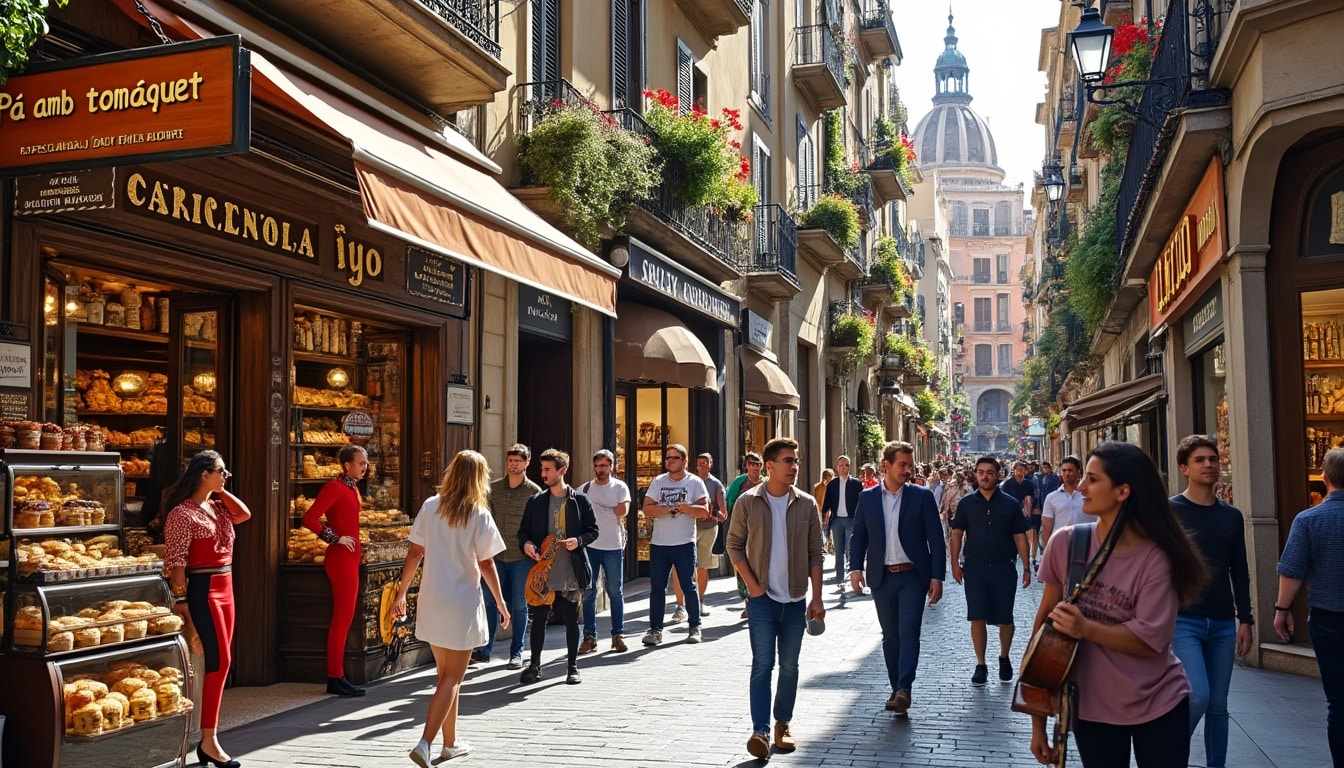Barcelona, one of Europe’s most captivating cities, showcases a unique blend of culture, history, and culinary excellence. When visiting this vibrant city, understanding the local currency and tipping customs can greatly enhance your travel experience. This guide delves into the nuances of currency use in Barcelona, highlights the diverse payment methods available, and unravels the intricate customs surrounding tipping in various settings such as restaurants, hotels, and transport. Equip yourself with this knowledge to navigate Barcelona like a local and make your journey even more enjoyable.
Understanding Currency and Payment Methods in Barcelona
When traveling to Barcelona, dealing with currency becomes an essential aspect of the experience. The official currency of Spain, and therefore Barcelona, is the euro (€). It’s important to know the basics of currency handling to make your transactions smooth and hassle-free.
Cash versus Cards: While credit and debit cards are widely accepted in Barcelona, having some cash on hand is always advisable. Small establishments like local cafes or traditional markets may prefer cash transactions. However, major credit cards such as Visa, Mastercard, and American Express are accepted almost everywhere, from fine dining restaurants to retail stores. Additionally, digital payment platforms like PayPal offer another easy way to manage transactions in the city.
Exchange Rates and Currency Exchange: It’s worth noting that exchange rates fluctuate, so staying updated is useful to get the best conversion for your money. You can exchange currency at banks, special exchange offices, or even at some hotels. However, services like Revolut and TransferWise offer competitive rates and the convenience of digital transactions, making them popular among travelers.
Using ATMs: ATMs are abundant in Barcelona and are often the easiest way to withdraw cash in euros. When using an ATM, opt for withdrawals in euros to avoid dynamic currency conversion fees. Note that some ATMs may charge a fee for foreign cards, so it’s wise to check with your bank before traveling.
Mobile Payments: In 2025, mobile payment methods have become increasingly popular. Services like Apple Pay and Google Wallet can be handy for quick transactions, but make sure your phone is compatible with the local infrastructure.
In summary, Barcelona offers a mix of traditional and modern payment options, ensuring that every traveler finds a convenient method to fit their needs. Whether you prefer dealing in cash at local cafes or swiping your Mastercard at fine dining establishments, being prepared is key to a seamless experience.

Tipping Customs in Barcelona Restaurants
One of the most common questions travelers have when dining out in Barcelona is, “Should I tip?” The answer is nuanced and largely based on personal preference rather than necessity.
Traditional Dining: For family-run restaurants or friendly local cafes, it’s common to leave a small tip, usually by rounding up the bill or leaving 1-2 euros. This gesture is appreciated but not expected, and it doesn’t have to match a specific percentage like in the U.S.
Fine Dining Establishments: In upscale venues, tipping is slightly more customary. Patrons often leave a tip of about 5-10% if the service is exceptional. However, once again, this is not mandatory, and patrons won’t be frowned upon for not tipping.
Service Charges: Sometimes, your bill might include a service charge, especially in fine dining settings. If this is the case, there’s no need to provide an additional tip unless you feel the service was truly above and beyond.
It’s essential to understand that the tipping culture in Barcelona, as well as in much of Spain, is not as obligatory as in some other parts of the world. Locals generally appreciate good service with a modest tip, respecting the individuality of both the patron and the service provider.
Tipping in Barcelona: Hotels and Accommodation
Tipping customs in Barcelona extend beyond dining and touch on various aspects of hospitality, including hotels. Whether opting for a luxury suite or a modest hostel, knowing when and how much to tip can enhance your stay.
Luxury Hotels: In higher-end hotels, tipping staff such as concierges and porters is a way to show appreciation for their services. General tips include about 1-2 euros per bag carried and 2-5 euros per day for housekeeping if the service is exceptional. Always tip in cash, as many hotels in Barcelona do not accommodate tips via credit card transactions.
Budget-Friendly Accommodations: If you’re staying in more economical lodgings, tipping is less common but still appreciated. For outstanding service, a small tip of 1-2 euros for housekeeping would be a lovely gesture. However, keep in mind that the local salary structure does not depend on tips, making them entirely optional.
Avoiding the Tip Jar: While you may encounter tip jars at hotel cafes or bars, remember these aren’t universal. Just like with other services, tipping here is entirely discretionary.
Barcelona’s diversity in accommodation options ensures that hotels can cater to all preferences, be it a luxurious getaway or a cozy stay. Deciding to tip can further personalize your experience, making it all the more memorable.
Transport Tips: Taxis, Private Rides, and More
Getting around Barcelona involves a mix of public transport, taxis, and private ride services. Each mode of transport has its own set of unwritten rules for tipping.
Taxis: In Barcelona, taxi tipping isn’t customary but appreciated. Returning small change from a cash transaction or rounding up the fare to the nearest euro is a common practice. If your trip is extended or the driver assists with luggage, a modest tip of 1-2 euros is appropriate.
Private Cab Services: Services like Uber or local equivalents might not expect tips, but if your ride is exceptional, add a 5-10% tip through the app or in cash.
Public Transport: The metro and buses in Barcelona do not require tipping. Instead, look for transport passes or cards for convenience and savings during your stay.
Overall, tipping can enhance the relationship between tourists and locals, deepening the appreciation for services received while enjoying this magnificent city’s sights.
Tipping Tour Guides and Cultural Experiences
Barcelona is rich in cultural landmarks and guided tours. Understanding the tipping etiquette for these experiences ensures respectful acknowledgment of your guide’s expertise.
Walking Tours: After a comprehensive walking tour, as you savor the city’s beauty and history, it’s customary to tip your guide, especially if the tour exceeded expectations. A general guideline is 10% of the tour cost, with more if the guide offers exceptional insight or personal anecdotes.
Museum or Event Guides: Although not obligatory, rewarding an engaging museum guide with a small tip is a friendly gesture, especially if they’ve enriched your visit with exceptional stories or attentiveness.
Experiential Workshops: Culinary classes or artisan workshops might not typically include tipping. Yet, providing a few extra euros if the experience was particularly enriching can be a lovely personal touch.
Participating in these cultural experiences in Barcelona allows you to engage with the city on a deeper level, revealing its hidden gems through the lens of passionate locals.
Comparative Tipping in European Cities
Understanding Barcelona’s tipping customs also involves comparing them with practices in neighboring European cities. Here’s a snapshot of how other vibrant capitals handle tips:
| City | Restaurant Tipping | Taxi Tipping | Hotel Tipping |
|---|---|---|---|
| Barcelona | 5-10% for good service | Round up & spare change | Optional; 1-2 euros for bags |
| Paris | 5-10% if service not included | Round up, plus 1-2 euros | 1-2 euros for staff assistance |
| Lisbon | 5-10% in tourist areas | Rounding up the bill | 1-2 euros, especially for staff |
| Rome | 5-10% for exceptional service | Round up, typically | Small token of appreciation |
Comparing these cities highlights the diversity in tipping cultures within Europe. While Barcelona’s tipping practices remain informal, it’s essential to stay informed to ensure your respect for local customs wherever you roam.
FAQs About Tipping in Barcelona
Do locals in Barcelona tip regularly?
No, tipping isn’t customary for most locals, though appreciated for exceptional services.
- 🙋♂️ Do they accept international cards like Visa or Mastercard? Most businesses, including restaurants and shops, accept major credit cards.
- 🗺️ What’s the best way to obtain euros for my trip? Withdraw from local ATMs, use currency exchange services, or opt for digital platforms like Revolut or TransferWise.
- 🚖 How much should I tip taxi drivers? Taxi drivers are not usually tipped, but rounding off the fare is common if you wish to show gratitude.
- 🏨 Are service charges included in hotel bills? This can vary; always check your bill for specifics regarding service charges.
- 🏛️ Should I always tip tour guides? Tipping the guide based on service quality is kind, but not essential for most tours.
By understanding Barcelona’s currency and tipping systems, you create a more enjoyable and respectful journey, connecting deeply with both the city and its inhabitants. As you explore this enchanting city, remember that your willingness to adapt to local customs forms a mutual path of appreciation and cultural respect. 🌟

